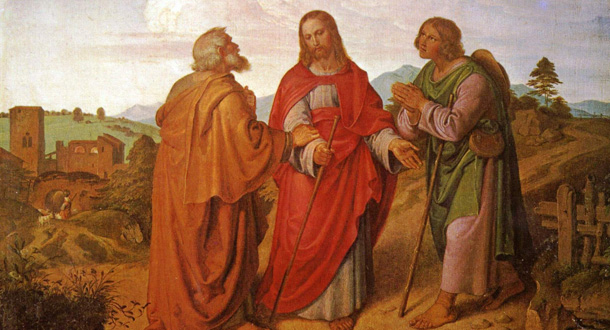Reflection:
We continue in the Easter Season filled with joy at the knowledge of the Resurrection. Today’s Gospel recounts the story of the disciples on the road to Emmaus and their encounter with Jesus, whom they didn’t recognize. Whenever I hear this gospel, I wonder why the disciples didn’t recognize Jesus. The recounting of what had just happened was on their lips, all of it was fresh in their minds, they had presumably known and witnessed Jesus throughout his public life, but still they didn’t recognize him. In fact, even as he talks with them about the meanings of the scriptures, there is still no recognition. Perhaps in their busyness “conversing and debating” about the drama of the events that it hampered them from seeing Jesus for who he was.
So he came and sat with them, and the gospel tells us that it was then, in the breaking of the bread, that they knew him. I think that we often fail to see Jesus in our lives until we, too, recognize him in the breaking of the bread.
I am reading Ronald Rolheiser’s wonderful book, Our One Great Act of Fidelity, and in it he writes of the many dimensions of the Eucharist, including the Eucharist as a meal, as a celebration, as our unity within the Body of Christ, as our daily bread and as God’s physical embrace among others. I think these dimensions are also valid in the meaning of the breaking of the bread and each of these brings us to a new recognition of Jesus. We find Jesus daily in our Eucharist as the bread is broken at the table and then as we as church vividly recalled last week, we find Jesus in his dying on the Cross, the Body broken for us. We recognize Jesus also in our reconciliation after we have broken our unity within the body of Christ through sin.
Sometimes we find a new recognition of Jesus when we become the bread that is broken, when we suffer a deep loss, a sorrow, an affliction that we know we can’t carry alone. In hopelessness, we turn to Jesus, and he is there at the cross with us. Because of our brokenness, and because of Jesus’ humanity and his passion, we are able to recognize him. When we bring our burdens to Jesus, we enter into the love story that he revealed through His death on the Cross. It is truly then in the breaking of the bread, we come to recognize Jesus as our God, our friend, our companion, our lover. He is there with us, holding us, letting us know that he understands our suffering. Thus our burdens become lightened, our sorrows are turned to joy, our deaths to resurrections. And we experience the paschal mystery once again.
Mary Lou Butler is a long-time friend and partner in ministry to the Passionists in California.

